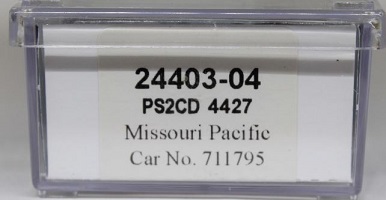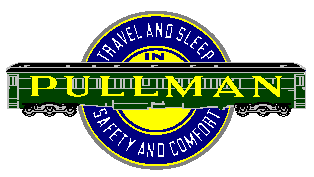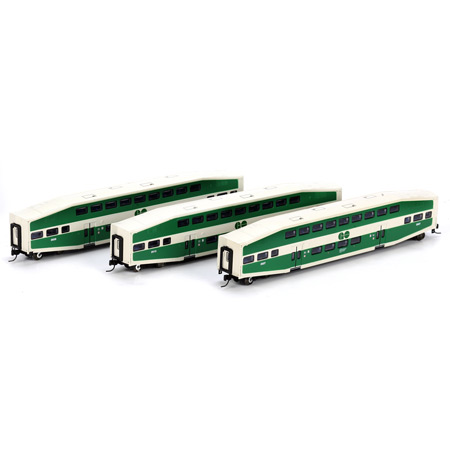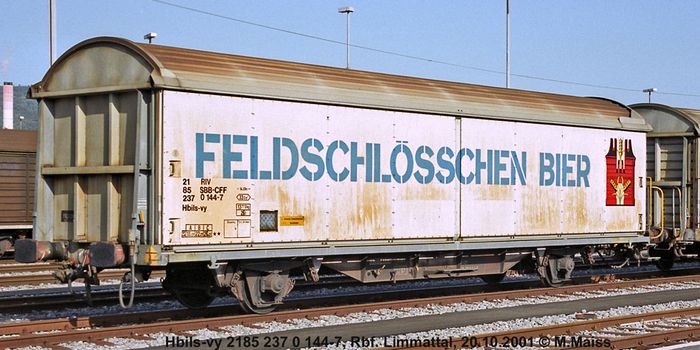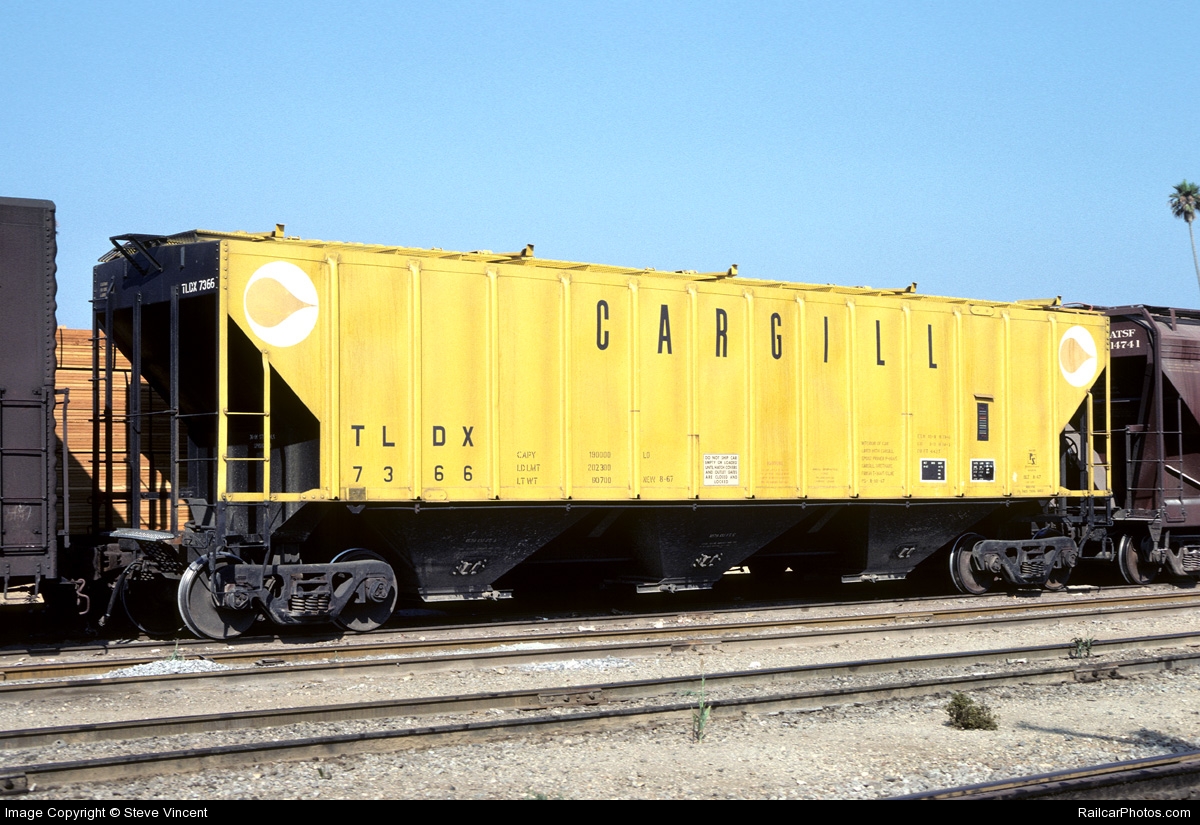Model Information: Properly weighted for superior tracking, the Trainworx Pullman Standard PS-2CD 4427 High Side Covered Hopper models have body mounted magnetic knuckle couplers, etched metal grab irons and roofwalks, three different trough hatch styles, jack pads (where appropriate), and 100 ton trucks with Fox Valley metal wheels.
Prototype History: Valued for its large capacity, roof trough hatches, and center discharge gates, the 4427 PS-2 CD High-Side Covered Hopper was a favorite for hauling grain. These large hoppers could be found across the continent hauling grain and other medium-density loads beginning in the 1960s, often in multi-car cuts or unit trains. Many are still seen in service during the fall harvest, 30 years after their construction.
Even with Pullman Standard Car Manufacturing Company's passenger car designs and patents spun off to a separate company called Pullman Technology in 1982 (which was eventually sold to Canadian based Bombardier in 1987) and Pullman Standard's remaining railcar manufacturing plants and freight car designs and patents sold to Trinity Industries in 1984, American manufactured Pullman freight and passenger cars were (and to this point in time still are) well known in North America.
When it came to hauling dry bulk goods such as agricultural commodities, cement, clay, dry chemicals, salt, or sand. many railroads and private owners selected the Pullman Standard PS-2 series covered hopper.
Utilized to transport dense and heavy granular products like cement, clay, potash, and sand, due to North American axle weight load limits, two (and later) three bay models were often chosen.
When it came to hauling much lighter commodities such as barley, corn, grain, malt, oats, soybeans, sugar, and wheat, these kinds of products would most commonly be transported in three or four bay covered hoppers.
Unlike two bay models, large four bay cars lend themselves to rapid load and discharge operations.
While there are a wide range of products covered by the PS-2 designation, it was Pullman's 4427 cubic foot capacity covered hopper that stood out as being the first of the larger capacity models to be manufactured in greater numbers.
Introduced as the PS-2CD (center discharge) in late 1963, the early production "low hip" design 4427 cubic foot capacity cars had low body sides, which concealed most of the hopper bay area.
The manufacturing of "high hip" design raised side 4427 models commenced in November 1966.
Over 19,300 PS2-CD 4,427 cars were produced.
Visibly apparent are a few different body style variations.
With the latter style being the most popular choice, the top of the covered hoppers could be fitted with large trough style openings, or, a series of round ones.
With the latter position being most common, brake wheels could be positioned high up on the body end, or, low mounted.
Even with Pullman Standard Car Manufacturing Company's passenger car designs and patents spun off to a separate company called Pullman Technology in 1982 (which was eventually sold to Canadian based Bombardier in 1987) and Pullman Standard's remaining railcar manufacturing plants and freight car designs and patents sold to Trinity Industries in 1984, American manufactured Pullman freight and passenger cars were (and to this point in time still are) well known in North America.
When it came to hauling dry bulk goods such as agricultural commodities, cement, clay, dry chemicals, salt, or sand. many railroads and private owners selected the Pullman Standard PS-2 series covered hopper.
Utilized to transport dense and heavy granular products like cement, clay, potash, and sand, due to North American axle weight load limits, two (and later) three bay models were often chosen.
When it came to hauling much lighter commodities such as barley, corn, grain, malt, oats, soybeans, sugar, and wheat, these kinds of products would most commonly be transported in three or four bay covered hoppers.
Unlike two bay models, large four bay cars lend themselves to rapid load and discharge operations.
While there are a wide range of products covered by the PS-2 designation, it was Pullman's 4427 cubic foot capacity covered hopper that stood out as being the first of the larger capacity models to be manufactured in greater numbers.
Introduced as the PS-2CD (center discharge) in late 1963, the early production "low hip" design 4427 cubic foot capacity cars had low body sides, which concealed most of the hopper bay area.
The manufacturing of "high hip" design raised side 4427 models commenced in November 1966.
Over 19,300 PS2-CD 4,427 cars were produced.
Visibly apparent are a few different body style variations.
With the latter style being the most popular choice, the top of the covered hoppers could be fitted with large trough style openings, or, a series of round ones.
With the latter position being most common, brake wheels could be positioned high up on the body end, or, low mounted.
Road Name History: 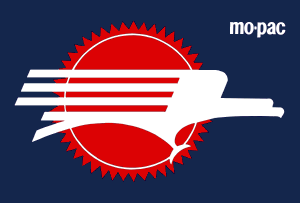 The Missouri Pacific Railroad (reporting mark MP), commonly abbreviated MoPac, with nickname of The Mop, was one of the first railroads in the United States west of the Mississippi River. MoPac was a Class I railroad growing from dozens of predecessors and mergers, including the St. Louis, Iron Mountain and Southern Railway (SLIMS), Texas and Pacific Railway (TP), Chicago and Eastern Illinois Railroad (C&EI), St. Louis, Brownsville and Mexico Railway (SLBM), Kansas, Oklahoma and Gulf Railway (KO&G), Midland Valley Railroad (MV), San Antonio, Uvalde and Gulf Railroad (SAU&G), Gulf Coast Lines (GC), International-Great Northern Railroad (IGN), New Orleans, Texas and Mexico Railway (NOTM), Missouri-Illinois Railroad (MI), as well as the small Central Branch Railway (an early predecessor of MP in Kansas and south central Nebraska), and joint ventures such as the Alton and Southern Railroad (AS).
The Missouri Pacific Railroad (reporting mark MP), commonly abbreviated MoPac, with nickname of The Mop, was one of the first railroads in the United States west of the Mississippi River. MoPac was a Class I railroad growing from dozens of predecessors and mergers, including the St. Louis, Iron Mountain and Southern Railway (SLIMS), Texas and Pacific Railway (TP), Chicago and Eastern Illinois Railroad (C&EI), St. Louis, Brownsville and Mexico Railway (SLBM), Kansas, Oklahoma and Gulf Railway (KO&G), Midland Valley Railroad (MV), San Antonio, Uvalde and Gulf Railroad (SAU&G), Gulf Coast Lines (GC), International-Great Northern Railroad (IGN), New Orleans, Texas and Mexico Railway (NOTM), Missouri-Illinois Railroad (MI), as well as the small Central Branch Railway (an early predecessor of MP in Kansas and south central Nebraska), and joint ventures such as the Alton and Southern Railroad (AS).
In 1967, the railroad operated 9,041 miles of road and 13,318 miles of track, not including DK&S, NO&LC, T&P and its subsidiaries, C&EI and Missouri-Illinois.
On January 8, 1980, the Union Pacific Railroad agreed to buy the Missouri Pacific Railroad. Lawsuits filed by competing railroads delayed approval of the merger until September 13, 1982. After the Supreme Court denied a trial to the Southern Pacific, the merger took effect on December 22, 1982. However, due to outstanding bonds of the Missouri Pacific, the merger with Union Pacific become official only on January 1, 1997.
Read more on Wikipedia.

In 1967, the railroad operated 9,041 miles of road and 13,318 miles of track, not including DK&S, NO&LC, T&P and its subsidiaries, C&EI and Missouri-Illinois.
On January 8, 1980, the Union Pacific Railroad agreed to buy the Missouri Pacific Railroad. Lawsuits filed by competing railroads delayed approval of the merger until September 13, 1982. After the Supreme Court denied a trial to the Southern Pacific, the merger took effect on December 22, 1982. However, due to outstanding bonds of the Missouri Pacific, the merger with Union Pacific become official only on January 1, 1997.
Read more on Wikipedia.
Brand/Importer Information:  Trainworx was founded in 1999 by Pat Sanders and is located in Delta Colorado. Their first freight car was the Quad hopper and it was released in 2000. They have been making N scale products ever since. Their website can be found at www.train-worx.com. As of 2016, they have produced 8 different rolling stock body styles as well as a range of different highway vehicles in N Scale. Their limited edition runs have proven a huge success with collectors and modelers enjoy the accuracy of all their products.
Trainworx was founded in 1999 by Pat Sanders and is located in Delta Colorado. Their first freight car was the Quad hopper and it was released in 2000. They have been making N scale products ever since. Their website can be found at www.train-worx.com. As of 2016, they have produced 8 different rolling stock body styles as well as a range of different highway vehicles in N Scale. Their limited edition runs have proven a huge success with collectors and modelers enjoy the accuracy of all their products.
Trainworx sells their products both through tradional retail channels as well as directly by phone order. When asked "What prompted you to found Trainworx?", Pat Sanders responded "There was a freight car that hadn't been done in N scale that I just had to have and it didn't look like anyone was ever going to make it."

Trainworx sells their products both through tradional retail channels as well as directly by phone order. When asked "What prompted you to found Trainworx?", Pat Sanders responded "There was a freight car that hadn't been done in N scale that I just had to have and it didn't look like anyone was ever going to make it."
Item created by: gdm on 2016-02-09 17:13:58. Last edited by baggedbird on 2022-09-13 19:50:26
If you see errors or missing data in this entry, please feel free to log in and edit it. Anyone with a Gmail account can log in instantly.
If you see errors or missing data in this entry, please feel free to log in and edit it. Anyone with a Gmail account can log in instantly.



